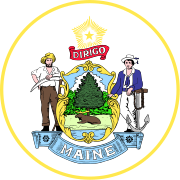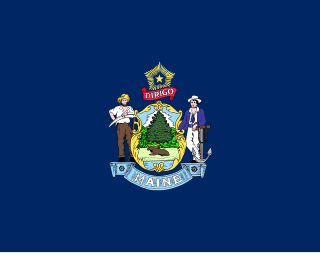This is a list of notable events in the history of LGBT rights that took place in the year 2005.

Same-sex marriage has been legally recognized in Washington state since December 6, 2012.

In response to court action in a number of states, the United States federal government and a number of state legislatures passed or attempted to pass legislation either prohibiting or allowing same-sex marriage or other types of same-sex unions.
Same-sex marriage has been legally recognized in the U.S. state of Wisconsin since October 6, 2014, upon the resolution of a lawsuit challenging the state's ban on same-sex marriage. On October 6, the U.S. Supreme Court refused to hear an appeal of an appellate court ruling in Wolf v. Walker that had found Wisconsin's ban on same-sex marriage unconstitutional. The appellate court issued its order prohibiting enforcement of the state's ban on same-sex marriage the next day and Wisconsin counties began issuing marriage licenses to same-sex couples immediately.
The Politics of Maryland concerns Maryland, as one of the states comprising the United States, and so is subject to both state and federal politics.

The National Organization for Marriage (NOM) is an American non-profit political organization established in 2007 to work against the legalization of same-sex marriage in the United States. It was formed in 2007 specifically to pass California Proposition 8 prohibiting same-sex marriage in California. The group has opposed civil union legislation and gay adoption, and has fought against allowing transgender individuals to use bathrooms that accord with their gender identity. Brian S. Brown has served as the group's president since 2010.

The 2009 Washington Referendum 71 (R-71) legalized domestic partnership in Washington state, the first statewide referendum in the United States that extended to LGBT people the rights and responsibility of domestic partnership. The bill had passed State Legislature, and it was signed into law by the Governor in May 2009, but opponents gathered enough signatures to put the measure before the voters, who returned ballots by mail over three weeks ending on November 3, 2009, approving the measure 53% to 47%. The new law went into effect 30 days later, on December 3, 2009.
Dennis S. Damon is an American politician from Maine. Damon served as a Democratic State Senator from Maine's 5th, then following redistricting, 28th District, representing much of Hancock County, including the population centers of Bar Harbor and Ellsworth from 2002 to 2010.

Even before the Obergefell v. Hodges Supreme Court ruling making same-sex marriage legal across all the states of the United States, same-sex marriage was legal in all of the New England states: Connecticut, Maine, Massachusetts, New Hampshire, Rhode Island and Vermont, as well as in the neighboring states of New York, New Jersey, Pennsylvania, Maryland and Delaware. The New England region has been noted for being the nucleus of the same-sex marriage movement in the United States, with the region having among the most widespread and earliest legal support of any region. In 2004, Massachusetts became the first state in the United States to legalize same-sex marriage, to be followed by three more states between October 2008 and June 2009. This followed Vermont being the first-in-the-nation with civil unions in 2000. Before the 2012 election, California (2008), Iowa (2009), New York (2011) and the District of Columbia (2010) had been the only U.S. jurisdictions outside New England to have performed same-sex marriages, though same-sex marriages in California had been halted following the passage of Proposition 8.
Mary L. Bonauto is an American lawyer and civil rights advocate who has worked to eradicate discrimination based on sexual orientation and gender identity, and has been referred to by US Representative Barney Frank as "our Thurgood Marshall." She began working with the Massachusetts-based Gay & Lesbian Advocates & Defenders, now named GLBTQ Legal Advocates & Defenders (GLAD) organization in 1990. A resident of Portland, Maine, Bonauto was one of the leaders who both worked with the Maine legislature to pass a same-sex marriage law and to defend it at the ballot in a narrow loss during the 2009 election campaign. These efforts were successful when, in the 2012 election, Maine voters approved the measure, making it the first state to allow same-sex marriage licenses via ballot vote. Bonauto is best known for being lead counsel in the case Goodridge v. Department of Public Health which made Massachusetts the first state in which same-sex couples could marry in 2004. She is also responsible for leading the first strategic challenges to section three of the Defense of Marriage Act (DOMA).

Lesbian, gay, bisexual, transgender, and queer (LGBTQ+) rights in the U.S. state of Maine are a recent occurrence, with most advances and enhances in LGBT rights in the state taking place since the early 2000s. LGBTQ+ people in Maine have some of the same rights and responsibilities as heterosexuals, however may face some legal issues not experienced by non-LGBTQ+ residents.

Maine Question 1 was a voter referendum on an initiated state statute that occurred November 6, 2012. The title of the citizen initiative is "An Act to Allow Marriage Licenses for Same-Sex Couples and Protect Religious Freedom". The question that appeared on the ballot was: "Do you want to allow the State of Maine to issue marriage licenses to same-sex couples?"

Referendum 74 was a Washington state referendum to approve or reject the February 2012 bill that would legalize same-sex marriage in the state. On June 12, 2012, state officials announced that enough signatures in favor of the referendum had been submitted and scheduled the referendum to appear on the ballot in the November 6 general election. The law was upheld by voters in the November 6, 2012 election by a final margin of 7.4% and the result was certified on December 5.

Question 6 is a referendum that appeared on the general election ballot for the U.S. state of Maryland to allow voters to approve or reject the Civil Marriage Protection Act—a bill legalizing same-sex marriage passed by the General Assembly in 2012. The referendum was approved by 52.4% of voters on November 6, 2012 and thereafter went into effect on January 1, 2013.

The Thirty-fourth Amendment of the Constitution Act 2015 amended the Constitution of Ireland to permit marriage to be contracted by two persons without distinction as to their sex. Prior to the enactment, the Constitution was assumed to contain an implicit prohibition on same-sex marriage in the Republic of Ireland. It was approved at a referendum on 22 May 2015 by 62% of voters on a turnout of 61%. This was the first time that a state legalised same-sex marriage through a popular vote. Two legal challenges regarding the conduct of the referendum were dismissed on 30 July by the Court of Appeal, and the bill was signed into law by the President of Ireland on 29 August. An amendment to the Marriage Act 2015 provided for marriages permitted by the new constititional status. The act came into force on 16 November 2015; the first same-sex marriage ceremony was held on 17 November 2015.

Maine Question 1, "An Act To Strengthen the Maine Clean Election Act, Improve Disclosure and Make Other Changes to the Campaign Finance Laws", was a citizen-initiated referendum measure in Maine, which appeared on the November 3, 2015 statewide ballot. As the Maine Legislature did not exercise its ability to pass the bill on its own, it was placed on the ballot and approved by Maine voters.

Maine Question 1 was a people's veto referendum that appeared on the June 12, 2018 statewide ballot. It sought to reject a law passed by the Maine Legislature that suspended the implementation of ranked choice voting, authorized by Maine voters in a previous referendum, for use in Maine elections until and if an amendment to the Maine Constitution is passed to expressly permit it; failing that, the law would be automatically repealed in 2021. It qualified because supporters of the original referendum collected the necessary number of signatures from registered Maine voters. This vote coincided with primary elections in which party nominees for governor, U.S. Senate, U.S. House, and the Maine Legislature were chosen to run in general elections on November 6.

Maine Question 1, "Do you want to reject the section of Chapter 399 of the Public Laws of 2011 that requires new voters to register to vote at least two business days prior to an election?", was a 2011 people's veto referendum that rejected a bill repealing Election Day voter registration in Maine. The vote was held on November 8, 2011 after being placed on the ballot due to supporters collecting the necessary number of signatures. The veto effort was successful, with 237,024 votes in favor of repeal to 155,156 against repeal.

Maine Question 3, formally An Act to Require Background Checks for Gun Sales, was a citizen-initiated referendum question that appeared on the Maine November 8, 2016 statewide ballot. It sought to require a background check for virtually all gun transfers in Maine, with some exceptions. As the Maine Legislature and Governor Paul LePage declined to enact the proposal as written, it appeared on the ballot along with elections for President of the United States, Maine's two United States House seats, the Maine Legislature, other statewide ballot questions, and various local elections.














